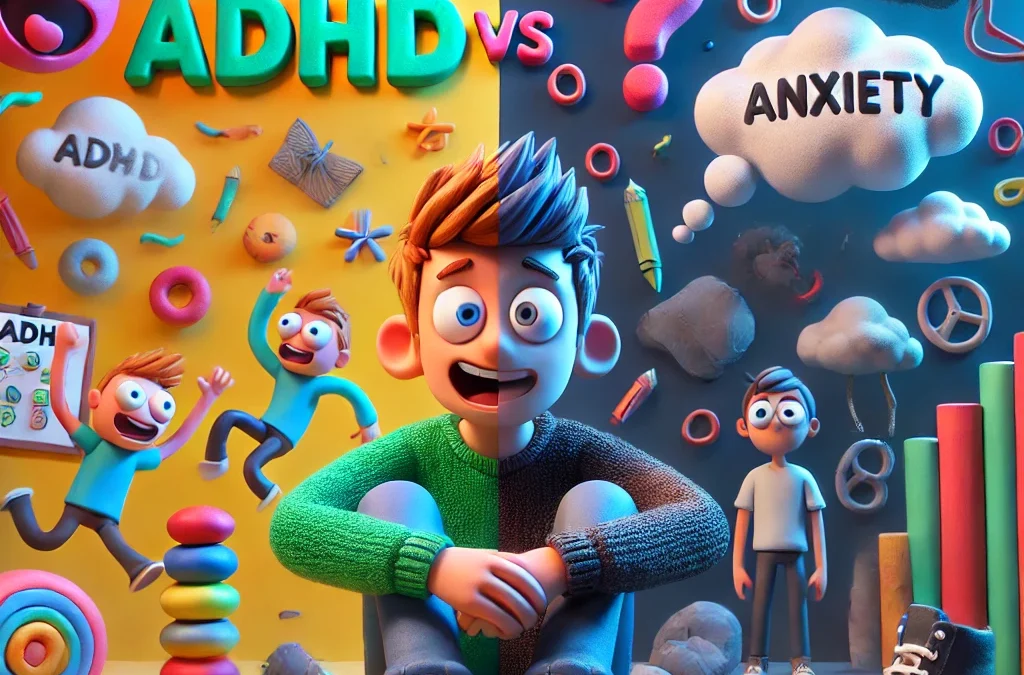ADHD vs. Anxiety: Let’s Break It Down
Hey, family! Let’s have a chat about ADHD and anxiety. These two often get mixed up, and I get it—they look alike from the outside. But really, they’re like two very different games that might look similar but have completely unique rules and objectives.
Just to be clear: ADHD and anxiety aren’t illnesses, and they don’t mean you’re broken. They’re just different ways that some brains work, like having a different playstyle. Let’s understand a bit more about what makes them different, where they come from, and how we can handle them, especially without always relying on meds.
ADHD vs. Anxiety: What’s the Difference?
Imagine ADHD and anxiety as cousins—they share some family traits, but they’re still very different people.
Focus Problems:
- If it’s ADHD, it’s like your brain’s scrolling through a bunch of TikTok’s—constantly hopping to the next thing without warning.
- If it’s anxiety, your brain keeps getting pulled away by that one worry that won’t let go, like a song stuck on repeat.
Energy Levels:
- ADHD makes you want to move, fidget, and talk non-stop because it’s as if your brain is cheering, “Go, go, go!” all the time.
- Anxiety brings a restless energy too, but it’s more because your brain’s overthinking everything: “What if this happens? What if that happens?”
Triggers:
- ADHD doesn’t need a specific trigger; it’s just part of how your brain is wired. It can show up anytime, anywhere.
- Anxiety often needs a reason to show up—it’s like your brain’s reaction to feeling unsafe or unsure about something.
Where Do ADHD and Anxiety Come From?
These are just quirks of the brain, and they come from different places inside our heads.
ADHD’s Origin:
It’s linked to having less dopamine, the brain’s “reward and motivation” chemical. This makes it harder to stay focused or get things done unless they’re super exciting.
Anxiety’s Origin:
It’s like your brain’s alarm system is stuck on high alert. It thinks there’s danger, even when things are actually okay, so it keeps sending out “be careful” signals.
What Keeps ADHD and Anxiety Going?
Think of them like engines—they both run on different fuels.
ADHD Gets Fuelled By:
- Boredom: ADHD hates boredom. The less interesting something is, the harder it gets to focus.
- Overwhelming Situations: When there’s too much going on at once, your brain might just check out and say, “Nope, I’m done!”
- Need for Constant Stimulation: Your brain loves the buzz of new things—hence why scrolling endlessly can be so tempting.
Anxiety Gets Fuelled By:
- Overthinking: It’s like your brain’s playing the “What if?” game on loop—sometimes about things that aren’t even real.
- Uncertainty: Not knowing what’s going to happen next can really set anxiety off.
- Stress: More stress leads to more anxiety—it’s like adding fuel to the fire.
They’re Not Illnesses, Just Different Ways of Thinking
Here’s something important to remember: ADHD and anxiety aren’t illnesses. They’re just ways your brain works.
Yes, they can make life more challenging sometimes. But they also come with some pretty cool strengths:
- ADHD Brains: Often incredibly creative, energetic, and amazing at thinking outside the box.
- Anxious Brains: Often super detail-oriented and great at spotting potential problems.
Instead of thinking, “I have a disorder,” try to see it this way: “My brain works differently, and that’s perfectly okay.”
Managing ADHD Without Meds
If you or someone in our family has ADHD, it’s not about just accepting chaos forever. Here are some things that can help:
- Break Big Tasks into Small Ones: Big projects can feel impossible, but breaking them into small steps makes them much more doable.
- Use Timers and Alarms: It’s like giving your brain little nudges to stay on track.
- Find Your Focus Zone: For some people, music helps; for others, quiet works better. Figure out what’s best for you.
- Get Moving: Physical activity helps use up all that extra energy.
- Mindfulness Exercises: Learning to stay in the moment can help slow down the mental chaos.
Managing Anxiety Without Meds
If anxiety feels like it’s running the show, there are ways to take back some control:
- Deep Breathing: It may sound simple, but it works. Breathe in for 4 seconds, hold for 4 seconds, and breathe out for 4 seconds. It tells your brain to calm down.
- Reality-Check Your Worries: Ask yourself, “Is this worry real, or am I blowing it out of proportion?” Often, worries are just that—worries, not facts.
- Write It Down: Putting worries on paper helps get them out of your head. It can be surprising how much this helps.
- Stick to a Routine: Knowing what’s coming next can make the world feel a bit less scary.
- Exercise: Moving your body is not just great for ADHD—it also helps to burn off anxiety’s energy.
Why Labels Aren’t Helpful
Here’s the thing about labels: sometimes, calling yourself “ADHD” or “anxious” can make things worse. It can become an excuse for staying stuck, like, “I can’t do this because of my ADHD” or “I can’t try because of my anxiety.”
Instead:
- Accept that your brain works differently, and that’s okay.
- Learn what helps you thrive, and go with it.
- Don’t think of these things as “bad”—they’re just part of who you are.
Final Thoughts: You’ve Got This
ADHD and anxiety aren’t enemies—they’re just different ways our brains work. When we stop fighting them and start understanding them, we can take control.
Our brains may be wired differently, but that doesn’t make us any less awesome. Remember, these are just parts of our story. You are so much more than these quirks—you’re a masterpiece in progress!
Keep learning, keep growing, and always love yourself for being exactly who you are.

